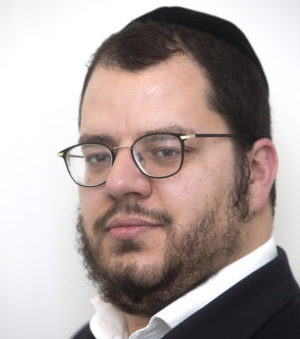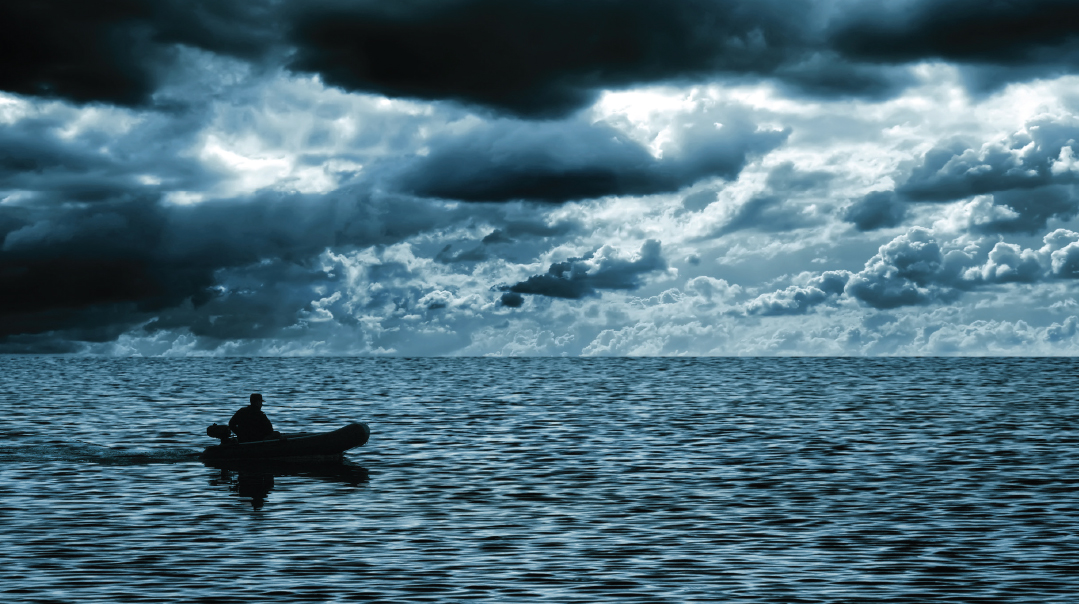From the Depths

Nine hours is a long time to be hanging in limbo at the gates of Death. But that’s how long we kept our heads above water in the Kinneret

Nine hours. Nine hours is a long time to be hanging in limbo at the gates of Death. But that’s how long we kept our heads above water in the Kinneret, holding on to a capsized boat — literally for dear life. As our arms grew weaker and the night grew darker, we began to make our peace with our yawning fate. There’s only so long you can hold on when your muscles are so stiff, the water so cold, and the blackness around you so utterly complete.
I’m a rosh yeshivah and father of a family; I’m not the type to do anything irresponsible or even adventurous. But in mid-May of this year, one of the main donors to my yeshivah — Yeshivat Neve Yaakov of Jerusalem — told me he was planning a quick trip to Israel, and his itinerary included a brief vacation in Teveria. I thought it would be nice to show him a personal gesture of appreciation, so I contacted a friend of mine who owns a yacht and asked if he could take my donor for a quick spin on the Kinneret.
We arranged to meet the donor at 4:30. I arrived an hour early, along with some students of mine from the yeshivah. I thought it would be nice to go out on the water a bit, and some of the other members of our little group offered to stay behind and greet the donor. The owner of the boat let us on, and his father and brother, who were there too, decided to come along for the ride.
It was the perfect scene — a clear afternoon in late May, a beautiful boat, a rare couple of hours of leisure against the endless blue of the water and sky. Then it call came crashing down. I will never understand exactly what went wrong — the experts don’t seem to know either — but I remember a tremendous wave came crashing over the boat, and within moments, I was submerged in the water.
When I reached the surface, I saw that our boat had capsized. My first thought was for the four other people on the boat. “Are you there? Are you all right?” I yelled. Thankfully, none of us had gotten injured. “Hold on to the boat!” I said. “No matter what you do, don’t let go!”
I didn’t have to tell anyone how dangerous our situation was. This was not the calm, placid beach that you think of when you imagine the Kinneret. We were several miles into the water, in a no-swimming zone, with strong waves. We were in big trouble.
The boat we were sailing on was fully licensed and equipped with distress flares and emergency equipment. But because it was upside-down, all that equipment was out of reach. The helmsman decided to dive under the boat and try to get out the flares. With bated breath, we watched him disappear under the boat, then emerge, shaking his head. With the boat upside down, he couldn’t get to the equipment. He rested for a few minutes, then took a deep breath and tried again. Again and again, he disappeared under the boat and then emerged, defeated. Finally, he gave up.
We tried to focus on the positive. Surely the little “welcoming committee” who’d stayed behind to greet our donor would realize something was wrong and send out a search party. But the hours went by, and nothing happened. Later we learned that they’d gotten distracted, and then at 5:30, when they realized this wasn’t some minor delay, the Arab lifeguard on duty didn’t want to lend them his cell phone to call for help.
By the time they got to a phone, it was already evening.
You have no idea how endless the sea looks until you’re submerged inside of it. We were still holding tight to the boat, still hopeful, but as the world turned darker and darker, we felt more fragile than we’d ever felt before.
The oldest among us, 60 or thereabouts, was a talmid of Rav Moshe Shapira ztz”l, the great baal machshavah. And so there in the Kinneret, in the most bizarre beis medrash I’ve ever seen, five desperate men clung to a boat instead of to shtenders, and began the most intense chaburah of their lives — a workshop on emunah and bitachon.
How we were supposed to behave in such a situation? Our voices rose and fell as we discussed the various approaches to our fate. On the one hand, we had to have bitachon that HaKadosh Baruch Hu could perform a miracle and save us. On the other hand, we had to resign ourselves to His will. And if He wanted our lives to end here, in the depths of the Kinneret, then we must accept His decision with perfect love. But that was no reason to let go and give up, we reminded ourselves. Because Hashem could save us at any moment. Still, this had nothing to do with us, it was completely up to Him, and if He decided otherwise, all we could tell ourselves was “b’yadcha afkid ruchi” — we’d submit to His will. And so, our chaburah continued, alternating between hope and resignation, salvation and submission.
The night got colder and darker, and our hands started to turn numb. We realized the end was approaching. It was time for Vidui and kabbalas ol malchus Shamayim. Then we began to sing passages from Ne’ilah and the Yom Kippur davening. As we sang, I thought about my family. “HaKadosh Baruch Hu,” I said, “whatever happens, that’s Your decision. Just one thing I ask: Keep my children on the right path, and support them after my passing. Give them the strength to cope. That is all I ask.”
The clock continued ticking, and the waves kept coming. Every time one of those waves surged toward us, we held our breath and gripped the boat as hard as we could. I’ve never experienced waves like these — they were incredibly high and forceful. It felt as if they were trying to pry us from the boat and snatch us into the deep. We had to exert very fiber of our being to fight them.
“Think of the pasuk ‘eitz chayim hi,’ ” one of our little group said. “The Torah is a tree of life to those who hold tight to it. Now we can understand it like never before. Let go for just a moment, and you’ve lost your connection to life.”
As we gripped our connection to life, I felt closer to Hashem than I’ve ever felt in my life. Even during Ne’ilah on Yom Kippur, the time of the greatest spiritual exaltation, I didn’t feel so close to Hashem as I did during those nine hours stranded in the middle of the sea. We kept scanning the horizon for some pinprick of light, some hope of a rescue crew — but there was not a sign of any help at all. All I could see was endless water; my palms were almost breaking from the pressure, my muscles were limp from exhaustion, and as another wave approached and crested, the only One I could lean on was HaKadosh Baruch Hu.
At some point, we heard a muffled roar, and then we saw a helicopter some distance away. They were coming! They were looking for us! I can’t describe our frantic hope. We tried to yell, to catch their attention — but then we realized how futile it was. Against the background of the buzzing, there was no way our voices would register.
Later, we learned that they had seen our overturned boat and assumed that we’d all been swept away by the current, so they decided to search further down, in the direction of the current.
One of the hardest things that I did that night — harder than saying a mental goodbye to my children — was forgiving a person who had wounded me very deeply, in a very painful personal issue. It had been years that I had been trying to let go of all the resentment and bitterness, to no avail. Now, face to face with my watery grave, I finally let go of the entire protracted issue and forgave him wholeheartedly.
Another hour passed, and another, and at a certain stage, my student stopped communicating. I tried to get him to speak, but there was no response. He was losing his will to hang on.
“Avremi, here’s my water bottle, I want you to drink something,” I urged him. “Drink, you need to get back some strength.”
Avremi didn’t take the bottle.
“Avremi, I’m telling you, I want you to drink something,” I tried again.
“Harav,” Avremi said, heaving, “I’m finished, I can’t do this anymore. I just don’t have any strength left. I’m leaving this up to Hashem. Whatever will be, will be. I just can’t hold on.”
“Avremi,” I said, “you need to hold on! Don’t just hold on to the boat — hold on with all your might to HaKadosh Baruch Hu. We’re going to be saved, we’re going to be okay. Remember, you’re not holding on to a fragile boat, you’re holding strong to HaKadosh Baruch Hu!”
And just as I said those words, at 1:45 a.m., I saw a light in the distance. We tried to wave with one hand while holding tight with the other. Could this be a reason to hope? The light kept drawing closer — but we couldn’t hear any voices. We started yelling as loud as our hoarse, spent voices would allow: “We’re here! Do you see us? We’re here, right by the boat!”
And then, we heard the most magical words: “We see you. Stay calm, we’re coming.”
Soon a rescue boat came into view. Again, the voice. “Are all five of you there? Are there still five?”
“Yes, we’re all here.”
“Can you swim?”
“No, we can’t move anymore,” we said.
“Hang on, we’re coming to get you.”
And within a few minutes, we were safe on the rescue boat.
Later, after we’d received medical care and were debriefed and made it back home, I found out what our families had endured. The whole country had been following the drama, and they’d all assumed the worst. Special trauma teams had been assigned to each of our families to help break the news and provide the necessary psychological assistance.
Everyone knew there was virtually no chance we could make it. True, we had life vests, but they were a paltry match for the massive waves. With every gale that swept across our little group, we had to tie the life vests back on. There was no way we could have tried swimming in them.
Israel isn’t a country that gives up easily. The rescue forces made so many efforts to find us: Two helicopters circled over the sea again and again, alongside water-police vessels and hundreds of searchers. No one could find us. The paramedic who took the night shift told me that he clocked in at 11 p.m., and the outgoing shift told him, “Tough night ahead, they’re expecting five exes.” Exes, he explained, are a euphemism for people no longer alive.
But the Creator had different plans. After nine hours of prayer, of faith, of acceptance and forgiveness — when our hope was just about gone — we got another chance at life. When every illusion had been stripped away, when we had no strength, no endurance, nothing left to lean on, He came through for us and pulled us out of the depths.
(Originally featured in Mishpacha, Issue 775)
Oops! We could not locate your form.













